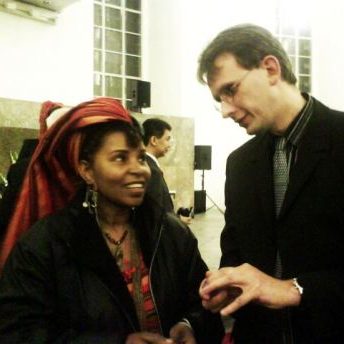My previous employer IBM launched “Sawubona Music Jam” in 2008 as a Social Responsibility Project, which ran until 2010, with the aim to raise donation funds for South Africa.
After initial plans to bring musical interaction into the Second Life platform never really took off (check out my song “Second Love” in the welcome section), it settled down to be a “normal” Social Media Web 2.0 site hosted on NING.
While I had personally been quite disappointed from the official overall results of the project (if there had been any substancial – by some reason the project simply omitted to harvest the ready fruits grown on that platform), still it had been my greatest time as a hobbyist musican to interact with people from Africa and other countries, to create some art far beyond the stereotypes of classical love songs, but to write songs and poems on topics that deal with existential problems of real people in real trouble, simply because they have different political opinions, are victims of racism or seek for personal freedom in a society that will not grant freedom for them.


Most of the songs of Sawubona Musicjam were written to feature Hans-Dieter Huober’s lyrics originally written in 1989/90 after the end of Apartheid, when he travelled to South Africa and felt to be one of the first white to visit Soweto township. He appeared to have met many lovely people there who got reflected well in his poems, so putting this into music had been a real pleasure to me.
When later a Poems Contest had been added, poets especially from Kenya, Nigeria and South Africa entered with really fresh and inspiring stuff, including the (International Literature Festival Berlin (ILB)seleted) contest winner Niran Okewole, as well as Kenya’s human rights activist and writer Philo Ikonya. For me, it seemed to be even more important to bring such touching words into music.
Some Examples: “Hope Springs and Flows” is Philo’s poem which I submitted as music right at the time when she got arrested after demonstrating for human rights, so when she left prison she could listen to her poem of hope and freedom as a song.

Some big surprize enlightened me, when Lucky Thobela managed to record the voice of Ouma Mbelengwa at her house, so I could feature her in her own song, i.e. bring her voice back into a poem about her and her husband Peter written in 1989/90. Lucky’s own song “Rainbow Scatterings” will be represented on the playlist as my remix version.
One of my major personal aims for Sawubona Musicjam had been to cooperate with as many people as possible, so I experimented to adopt many different music styles to appear “compatible” to everybody ready to join forces – of course with variable success. As a result, you might find this playlist would not qualify to be found on any conventional music album, since each song aims at least partly to other target audiences. As an example, you will find two version of Ouma Part II significantly different over the same notes
Sawubona Music Jam: Poetry Contest
I’ve noticed that whenever you mention “poetry” to a group, the reaction is far less enthusiastic than when you mention music. People tend to recall their schoolteacher’s favourite verse about flowers, love, and sentimentality—or, quite “romantic”, a poem celebrating the beauty of despair.
When our project team decided to launch a poetry contest on the Music Jam platform, I wasn’t sure what to expect. I’d come for the music first and to provide technical support second—but what unfolded was nothing like I’d imagined.
In the dead of night, I waited for our web designers to publish the poetry landing page. They ran late, and the contest entry form finally went live around midnight. How could I test it if submissions couldn’t be deleted easily? So I dashed off a short poem—just a few lines, hoping to be thoughtful somehow to inspire others, and tested the page functions and formatting. At about 2:30 a.m., I hit “Submit” and sent the designers my bug report, recommending them to fix my findings by morning.
That little test poem immediately connected me with writers across the globe—especially from Kenya and Nigeria, after their Goethe Institutes began supporting the project—and we soon found ourselves in profound discussions on the forum.
The next surprise was the content of the entries themselves. These weren’t the sweet, flowery verses of my old school anthologies but urgent reflections on an insecure, unequal world. Contestants tackled forced marriage in Nairobi’s slums (Anne Kamoni), free speech and women’s emancipation (Philo Ikonya), and countless other themes of freedom and solidarity.
My biggest shock came when that impromptu test poem won third prize from the International Literature Festival Berlin jury. It still feels surreal that a piece written for site testing earned a bronze—and I donated the prize money to an activist member of our poetry community who needed it most.
The sweetest surprise of all was about my final entry, “The End,” which poet Otiato Guguyu translated into Swahili.
I doubt I’ll ever encounter such genuine cultural exchange elsewhere.
If you’re still with me, please dive into my poetic experiments below!
Truth of Commission and Reconciliation
by Carsten Trotzkowski
I say they are guilty.
They are guilty because they did it.
Because they did it to us.
To us who never did anything.
Who never did anything to stop it.
To stop it which is not easy at all.
Not easy at all – what only few people tried.
Only few people tried, risking their lifes.
Risking their lifes because those thought they were guilty.
They were guilty because they did it.
Because they did it to them.
To them who never did anything.
Who never did anything to stop it.
–
To stop it which is not easy at all.
.
This poem ranked 3rd place in the finals of Sawubona Poetry Slam, under the jury of “international literature festival Berlin” (ilb)
The Poor and the Prim
(a double Poem)
by Carsten Trotzkowski
I am full of hope
This morning a lark sang
A fragile wakeup song
So I whispered my children
Just to rest for a while
But lil’ Moses said “How
Can it sing high and bonny?”
I said
“God sent the soul of
Your bro’ Jobe from heaven
To tell us the miracle
Of life”
We wallowed in admiration
Then ol’ Dave came up over:
“They’ll reopen our gem mine
And the earnings be equal and high”
So I reached for my Sunday’s
To apply for the headman
Though it’s hundreds who’ll also apply
I am full of hope
I doubt I will make it
T’day’s radio roused me
With hazardous stock news
So I called up my lawyer
For immediate plans
But that airhead whined “How
Will you file suit them boldly?”
I yelled
“Gov’ment’s sent waifers
For all black and bondsmen
To ruin our stock corp
To death”
I hung up in deep frustration
Then my wife shrilled my cellphone:
She’ll proceed with our parting
“Alimony insistently high”
So I reached for my notebook
To deploy “friends” for raid sweeps:
The black’s gem mine, so that hundreds will die
I doubt I will make it
The Bulletproof Sack
by Carsten Trotzkowski (for brave Philo Ikonya)
So please prepare this order
And buy from over border
A bulletproof sack.
Our state, it’s in disorder
We know Policemen’s order
For mercy to lack.
Her life, it is in danger
From any unknown stranger
From privileged pack.
So bolt your wheels much tighter
Beware the cigarette lighter
And lock tight your shack.
The sack will show the masses
That all suppression passes
That freedom’s on track!
Not only girls will wear it
But all the free shall share it
We – all – shall sail tack.
That symbol from the Great Book
Will open up the outlook:
Democracy’s back!
We’ll meet in parks and houses
Until nobody rouses
Our bulletproof sack.
As Billy Said
by Carsten Trotzkowski
As long as there are children there is hope.
As long as there is hope there are children.
While there are hoping children, there is friendship.
As long as they’re in friendship, there is peace.
As long as there’s no peace, there’s no freedom.
Still while there is no freedom, there is you.
As long as you are there, there’s a chance.
As long as there are chances, there’s your hope.
Now hoping children’s friendship’s peace sets free your chance that hoping children’s friendship’s peace sets free your chance that
hoping children’s friendship’s peace sets free your chance that….
That our hope will go on forever.
Valediction – Will She Be Waiting For Me?
by Carsten Trotzkowski
Butterflies, bees, waving weeds inside me
Am I happy, crazy, desparate?
But torn to parts I am
Affection, love, waving needs inside me
I am loving, oh so loving her!
But torn apart we are
Who is right? How could my views
Have been so wrong?
All those people that once cared for me, they –
Have they really said those words?
Have I mistaken them all time?
Can they be wrong in all they’ve told me? Or is my mind deceptive to myself…
But – oh – I fear she might suffer, suffer because she met me
Because her people will surely know, how I fear they know it now
That she has messed with people like me
That she has dressed for ogres like me
That she has slept with heathens like me
That –
But – oh – I recall how her eyes blazed, blazed because she met me.
Because her figure will surely enchant, all her entity enchanted me.
That I will crave to make her laugh
That I will prove her trust in me
That I will seek to heighten her beauty
That –
Who is right? How could my views
Have been so wrong?
All those tales come back to me, they –
Have they really done those deeds?
Have they antag’nized us all time?
Can mine be wrong in all they’ve showed me? Or is my kind deceptive to myself…
Elegies, hymns, waving screeds inside me
Am I sturdy, steady, done to leave?
Then torn from clod I’ll be
Early sunbeams guide my way to the veld…
Sweetest breeze takes my heart to the skies…
Dry river marks the borderline…
Will she be waiting for me?
The End
by Carsten Trotzkowski
Omega
Translation of “The End”
by Otiato Guguyu
So this is the end
The end we should have expected
We should have expected it looked good
It looked good but what did we expect from it?
What did we expect from it what we were not wanting to do?
We were not wanting to do selfish offences
To do selfish offences that hurt people
That hurt people we love
People we love go, so
.
So this is the end.
.
.
.
.
Don’t go!
Kumbe huu ndio mwisho
Mwisho ambao tungeutarajia
Uzuri wake matarajio yetu
Na maridadi ilionekana lakini tulitarajia Ni?
Tulilolitarajia tusilotaka kufanya
Hatukutaka kabisa dhambi za ubinafsi
Makosa ya ubinafsi yanayowadhuru watu
Ubinafsi utufanyao fidhuli
Fidhuli wanaowagugumiza wanaowapenda
.
Na wanaotupenda kwenda
.
.
.
.
Kumbe!